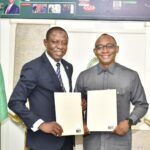By Kadiri Abdulrahman
The United States says the International Monetary Fund (IMF) and the World Bank should support its efforts to secure a more balanced, prosperous, and stable global economy.
The U.S Secretary of the Treasury, Scott Bessent, said this on Thursday in Washington, on the sidelines of the ongoing annual meetings of the IMF/World Bank group.
Bessent spoke in his message to the World Bank Development Committee and IMF International Monetary and Financial Committee.
He said that both instructions could support the U.S through a return to their core missions and disciplined deployment of their resources.
“We have seen some progress towards these goals since the spring meetings.
“The IMF is folding its climate and gender units into one that is focused on macro-financial and structural policies, and management has eliminated extraneous, non-core issues from its board work programme.
“The World Bank has moved in the direction of an all-of-the-above approach to energy by removing its prohibition on the financing of nuclear power generation,” he said.
Bessent said that the World Bank had also increased the weight given to quality in procurement decision making.
According to him, it also boosted outreach to industry, both of which stand to improve the efficiency and effectiveness of its financing.
“Nonetheless, the IMF and World Bank must take more concerted steps to focus on their respective core missions.
“They must deliver greater impact to the countries they support and greater value to taxpayers from the United States and other shareholders,” he said.
He said that the United States had been implementing President Donald Trump’s America First economic agenda of tax cuts, energy abundance and regulatory modernisation.
He described them as interlocking parts of an engine designed to drive economic growth and domestic manufacturing.
“At a global level, we have been encouraging others to follow our lead and to take steps to increase economic growth.
“However, the growth outlook remains weak and unbalanced. Many countries continue to face ongoing regional conflicts, governance challenges, and other barriers to economic prosperity such as overregulation.
“Strengthening resilience and pursuing policies and projects that boost productivity will help countries withstand shocks and grow while improving economic prospects worldwide.
“This is where the work of the IMF and the World Bank is critical,” he said.
Bessent said that the IMF was uniquely positioned to provide bilateral and multilateral economic surveillance that identifies imbalances and risks, facilitates the balanced growth of international trade, and discourages harmful policies.
He said that surveillance was the first layer of an effective global financial safety net.
“Unfortunately, the IMF’s adherence to this part of its mandate has weakened over the past decades.
“We expect the IMF to strengthen its surveillance activities and to do so with objectivity and even-handedness.
“This work should be focused on macroeconomic and financial stability, rather than other areas beyond the IMF’s expertise like climate and gender,” he said. (NAN)(www.nannews.ng)
Edited by Sadiya Hamza












